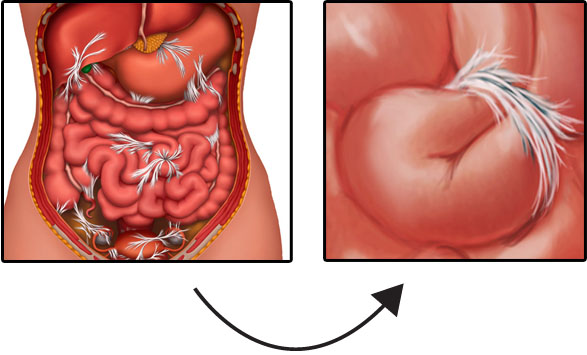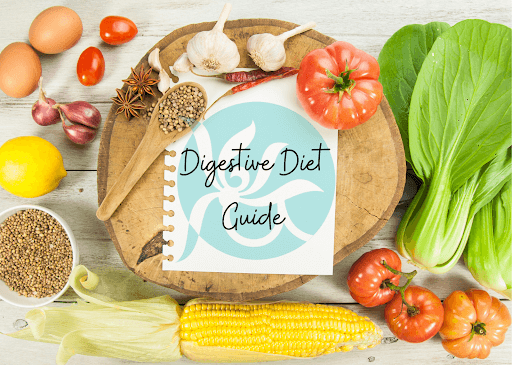Experience relief from bowel obstructions with Clear Passage Physical Therapy’s Free Consult and Request Info, offering a non-surgical, manual therapy approach that treats adhesions – the primary cause of most small bowel obstructions – potentially helping you avoid risky surgeries and recurrent blockages. To learn more about applying for therapy visit our Apply to Therapy page.
Table of Contents
What is a bowel obstruction?
An intestinal obstruction, also known as a bowel obstruction or bowel blockage occurs when food or liquid is unable to pass through either the large or small intestine. If left untreated, life-threatening complications such as tissue death or infection, even death, can occur.
Tissue death occurs when the intestinal obstruction cuts off blood supply to a section of your intestine and causes the tissue to die. The dead tissue weakens your intestinal wall which can lead to a tear, allowing the contents of the bowel to spread throughout the abdomen, a condition called Peritonitis. This infection that occurs deep within the abdomen is life-threatening. Surgery along with direct application of antibiotics to the infected internal sites are often required to save the patient’s life.

Symptoms of a bowel obstruction or bowel blockage
- Nausea and vomiting
- Constipation and inability to pass gas
- Abdominal distention, which can be confused with bloating
- Fever
- Tachycardia, which is a heart rate that exceeds the normal resting rate
- Loss of appetite
- Recurring abdominal pain
Causes of mechanical bowel obstructions
Adhesions: The most common cause of small bowel obstruction is intra-abdominal adhesions. Adhesions caused by abdominal or pelvic surgery cause about 65% to 75% of all small bowel obstructions. Adhesions are scar tissue that can form after infection, radiation therapy, inflammation, and most commonly, surgery. One of the reasons recurring bowel obstructions are so difficult to treat is that obstructions and blockages are often treated with surgery. Post-surgical adhesions can wrap around the intestine and squeeze it shut, similar to pinching a garden hose. In other cases, a stricture (narrowing) can occur, preventing liquids and food from passing through.
Hernias: When the intestine protrudes through an opening in the abdominal wall, it is called a hernia. Hernias can squeeze the bowel shut, making it difficult or impossible for contents to pass through the intestine. This causes impacted stool, a stricture, or a blockage to occur.
Crohn’s disease: This is a chronic inflammatory bowel disease that causes inflammation in the lining of the digestive tract. The constant inflammation leads to scarring and the formation of adhesions.
Malignancy: This is defined as the presence of a malignant tumor (cancer). A tumor can obstruct the intestine, causing a blockage.
Volvulus: This is an obstruction caused by the intestine being twisted or knotted. Once the intestine is twisted or knotted, nothing can pass through. This condition can also obstruct blood flow, causing tissue death.
Diverticulitis: Similar to Crohn’s disease, diverticulitis is an inflammation or infection in the small pouches of the digestive tract that can lead to scar tissue and constipation.
Food that can cause bowel obstructions
You may be wondering what food you can safely eat with a bowel obstruction. Here are some foods to avoid if you have been diagnosed with a bowel obstruction.
- Fruits with a cellulose structure can cause, or contribute to an obstruction. One of the most common fruits reported to cause intestinal obstructions is persimmons, though a large number of cases have been reported with citrus fruits in general and other dried fruits.
- Dried nuts and seeds.
- Whole grain or other high-fiber breads.
- Tough or stringy pieces of meat.
Bowel obstruction prevention
- Drink plenty of fluids – It is generally suggested that individuals drink 6 to 8 cups of water each day. Water helps food move more easily through the digestive tract.
- Chew your food thoroughly – Not chewing food well increases the amount of work your digestive tract must do and can contribute to intestinal obstructions.
- Clear Passage – A manual physical therapy that treats the adhesions causing recurring bowel obstructions – without surgery or drugs. By avoiding surgery, patients can often avoid repeat bowel obstructions because surgery is the primary cause of adhesions and bowel obstructions.
- Diet change – Changing your diet may help prevent future bowel obstructions.
Bowel obstruction treatment
Fasting – Allows the bowel to rest and helps reduce the risk of complications during surgery, if that becomes necessary.
Nasogastric intubation – An “NG Tube” is a tube that carries food and medicine down the throat and into the stomach and also pumps out excess stomach liquids in an effort to decompress the bowel.
Surgery – Surgery may be required to remove infected or necrotic (dead) tissue or to repair perforations to the bowel.
Click here to learn more about a non-surgical treatment option for bowel obstruction.
References
- http://emblog.mayo.edu/2015/01/04/the-truth-about-small-bowel-obstruction/
- http://www.sciencedirect.com/science/article/pii/0002961062903756
- https://www.mayoclinic.org/diseases-conditions/intestinal-obstruction/symptoms-causes/syc-20351460
- https://emedicine.medscape.com/article/774140-overview
- https://www.livestrong.com/article/313014-bowel-blockage-diet/
- https://www.health.qld.gov.au/__data/assets/pdf_file/0022/152473/gastro_obstruct.pdf
Related Content:
Research and Success Rates
- Study Results for a Non-Surgical Bowel Obstruction Treatment
- Study Results for a Non-Surgical Bowel Obstruction Treatment
- Bowel Obstruction Success Rates
Questions Answered
- Recurring Small Bowel Obstruction Treatment Frequently Asked Questions
- The Most Common Causes of Bowel Obstruction and How to Prevent It
- Bowel Blockage Symptoms
- How to Prevent Bowel Obstruction
- Can Diverticulitis Cause Bowel Obstruction?
- Seven Signs of Intestinal Blockage
- What to know before accepting an IBS Diagnosis
- How Long Does a Bowel Obstruction Last?
- What is the Cause of a Small Bowel Obstruction and What Are Your Options for Treatment?
- How Will My Lifestyle Change with Small Bowel Obstructions?
- Is There a Natural Treatment for Small Bowel Obstruction?
- What SBO Patients Can Expect From Treatment
Treatment
- At a Glance: Bowel Obstruction
- Bowel Obstruction
- Bowel Obstruction – Need Help Now?
- Bowel Obstruction Treatment
- [Infographic] The Main Causes of Bowel Obstructions
Patient’s Stories
- Bowel Obstruction: Patient Story Update
- Video Testimonial – A Mother’s Journey to Recovery: Small Bowel Obstruction
- What Is Bowel Obstruction? – A Patient’s Perspective
- A Glimpse into a Brave Young Boy’s Journey with CHARGE Syndrome
- Success Story: Clear Passage Allowed Me to Resume My Adventures
- Emergency Small Bowel Obstruction Surgery in India
- An End to Bowel Obstructions
Diet
- How to Relieve a Bowel Obstruction: Diet Guide
- Recipes For Bowel Obstruction Patients
- Diet Guide for Avoiding Bowel Obstruction
- Diet Modifications to Help You Handle a Small Bowel Obstruction
- Digestive Health Guide
- Bowel Obstruction: Diet & Lifestyle Recommendations
- Minimal Fiber Diet for Digestive Disorders
- Nutritional Guidelines
- Transitioning to a Regular Diet from a Low or Minimal Fiber Diet
- Low Fiber Diet for Digestive Disorders
Bowel Obstruction | SBO | SIBO






















